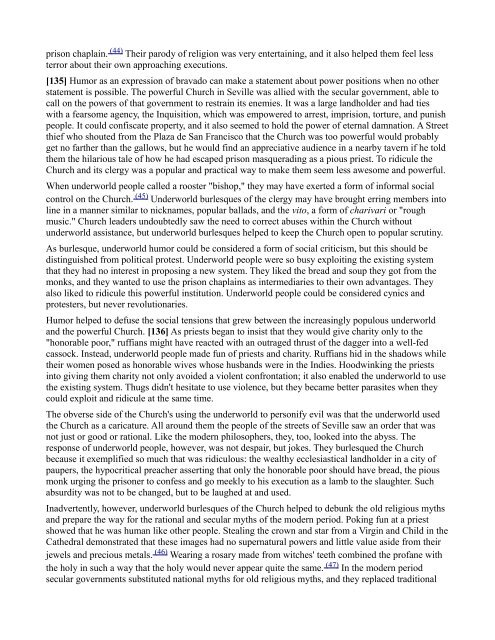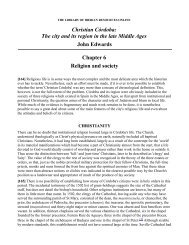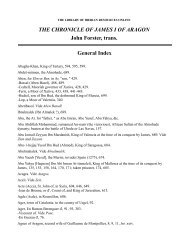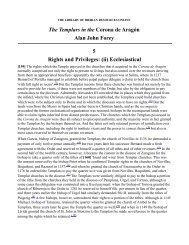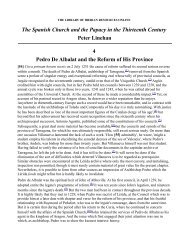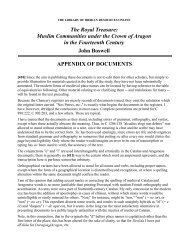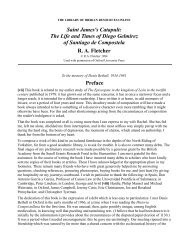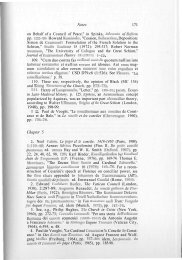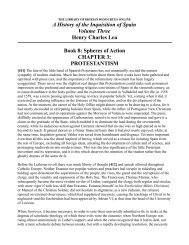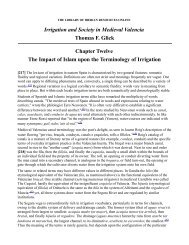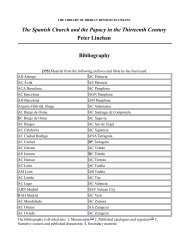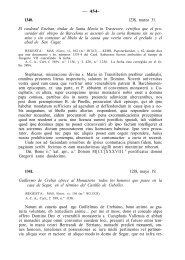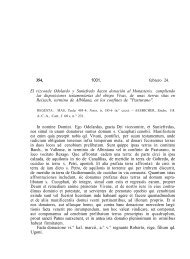Chapter 6 - The Library of Iberian Resources Online
Chapter 6 - The Library of Iberian Resources Online
Chapter 6 - The Library of Iberian Resources Online
You also want an ePaper? Increase the reach of your titles
YUMPU automatically turns print PDFs into web optimized ePapers that Google loves.
prison chaplain. (44) <strong>The</strong>ir parody <strong>of</strong> religion was very entertaining, and it also helped them feel less<br />
terror about their own approaching executions.<br />
[135] Humor as an expression <strong>of</strong> bravado can make a statement about power positions when no other<br />
statement is possible. <strong>The</strong> powerful Church in Seville was allied with the secular government, able to<br />
call on the powers <strong>of</strong> that government to restrain its enemies. It was a large landholder and had ties<br />
with a fearsome agency, the Inquisition, which was empowered to arrest, imprision, torture, and punish<br />
people. It could confiscate property, and it also seemed to hold the power <strong>of</strong> eternal damnation. A Street<br />
thief who shouted from the Plaza de San Francisco that the Church was too powerful would probably<br />
get no farther than the gallows, but he would find an appreciative audience in a nearby tavern if he told<br />
them the hilarious tale <strong>of</strong> how he had escaped prison masquerading as a pious priest. To ridicule the<br />
Church and its clergy was a popular and practical way to make them seem less awesome and powerful.<br />
When underworld people called a rooster "bishop," they may have exerted a form <strong>of</strong> informal social<br />
control on the Church. (45) Underworld burlesques <strong>of</strong> the clergy may have brought erring members into<br />
line in a manner similar to nicknames, popular ballads, and the vito, a form <strong>of</strong> charivari or "rough<br />
music." Church leaders undoubtedly saw the need to correct abuses within the Church without<br />
underworld assistance, but underworld burlesques helped to keep the Church open to popular scrutiny.<br />
As burlesque, underworld humor could be considered a form <strong>of</strong> social criticism, but this should be<br />
distinguished from political protest. Underworld people were so busy exploiting the existing system<br />
that they had no interest in proposing a new system. <strong>The</strong>y liked the bread and soup they got from the<br />
monks, and they wanted to use the prison chaplains as intermediaries to their own advantages. <strong>The</strong>y<br />
also liked to ridicule this powerful institution. Underworld people could be considered cynics and<br />
protesters, but never revolutionaries.<br />
Humor helped to defuse the social tensions that grew between the increasingly populous underworld<br />
and the powerful Church. [136] As priests began to insist that they would give charity only to the<br />
"honorable poor," ruffians might have reacted with an outraged thrust <strong>of</strong> the dagger into a well-fed<br />
cassock. Instead, underworld people made fun <strong>of</strong> priests and charity. Ruffians hid in the shadows while<br />
their women posed as honorable wives whose husbands were in the Indies. Hoodwinking the priests<br />
into giving them charity not only avoided a violent confrontation; it also enabled the underworld to use<br />
the existing system. Thugs didn't hesitate to use violence, but they became better parasites when they<br />
could exploit and ridicule at the same time.<br />
<strong>The</strong> obverse side <strong>of</strong> the Church's using the underworld to personify evil was that the underworld used<br />
the Church as a caricature. All around them the people <strong>of</strong> the streets <strong>of</strong> Seville saw an order that was<br />
not just or good or rational. Like the modern philosophers, they, too, looked into the abyss. <strong>The</strong><br />
response <strong>of</strong> underworld people, however, was not despair, but jokes. <strong>The</strong>y burlesqued the Church<br />
because it exemplified so much that was ridiculous: the wealthy ecclesiastical landholder in a city <strong>of</strong><br />
paupers, the hypocritical preacher asserting that only the honorable poor should have bread, the pious<br />
monk urging the prisoner to confess and go meekly to his execution as a lamb to the slaughter. Such<br />
absurdity was not to be changed, but to be laughed at and used.<br />
Inadvertently, however, underworld burlesques <strong>of</strong> the Church helped to debunk the old religious myths<br />
and prepare the way for the rational and secular myths <strong>of</strong> the modern period. Poking fun at a priest<br />
showed that he was human like other people. Stealing the crown and star from a Virgin and Child in the<br />
Cathedral demonstrated that these images had no supernatural powers and little value aside from their<br />
jewels and precious metals. (46) Wearing a rosary made from witches' teeth combined the pr<strong>of</strong>ane with<br />
the holy in such a way that the holy would never appear quite the same. (47) In the modern period<br />
secular governments substituted national myths for old religious myths, and they replaced traditional


